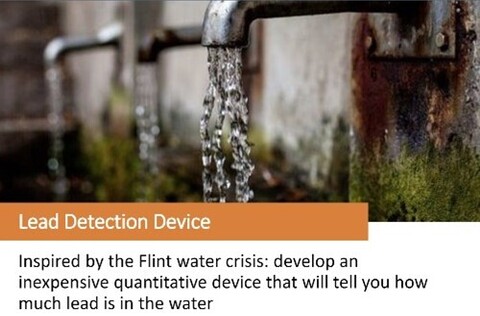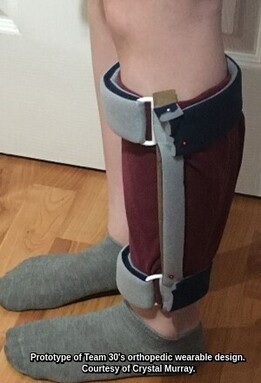Virtual Internship in Biomedical Engineering (VIBE)
Department(s):
Biomedical EngineeringThe world is more distributed and interconnected than ever before, and remote work continues to be the modus operandi of a the post-covid world. Biomedical Engineering, a leader in both research and student opportunity innovation, saw a chance to help students develop their research and professional identities. Indeed, the lack of internships for students in the Summer of 2021 led the Biomedical Engineering department at WPI to be innovative in what is a traditional internship market by creating a virtual option.
Project description provided by the VIBE Program

The Virtual Internship in Biomedical Engineering, or VIBE, was run by Professors Funmi Ayobami, Solomon Mensah, and Kris Billiar. The intention was to increase access to internships for underrepresented students and utilize the virtual aspect to bring students from across the country and world to collaborate.
VIBE has three main goals: Professional Development, the BME Design Process, and “Coffee and Conversations,” which took place during three weekly Zoom calls over an eight-week span. The professional development seminars were in collaboration with the Summer Professional Development Series for Undergraduates (SPuDS) and covered topics such as communicating research, ethics in BME, and scholarship opportunities. The VIBE meetings walked students through the aspects of the design process. Coffee and Conversations allowed students to hear about and discuss research and career paths,and explore their lived experiences as being under-represented in STEM with current WPI BME faculty in a supportive environment. The recorded Zooms also allowed the program to be completed completely asynchronously.
While this is a WPI program, WPI’s impact through the VIBE program is far-reaching. Students from 54 universities and colleges participated, and those students

were grouped into teams of 4-5 for the design challenge. Ten pre-selected projects were presented to students, and they ranked the options based on what interested them the most. Focused on global health and serving under-resourced and under-served communities, participants worked on projects including a lead filtration device, umbilical cord clamp for developing countries, and a testing device for infant diabetes. 245 students successfully completed the program and competed in the video pitch competition. Among the participants, students represented 12 countries including the US, India, Malaysia, Ghana, Pakistan, and Mexico, 63% were women or nonbinary, 26% were under-represented minorities, and 47% were first-generation students.
Awards were given in multiple categories including Innovation and most “likes.” Team 30’s design for an Orthopedic Wearable with Infrared Light to Stimulate Bone Healing won the VIBE Award for Innovation. The members of the team were Abigail Richardson, Alexandra Rodriguez, Christian Andre, and included WPI student, Crystal Murray. The junior, double majoring in biomedical engineering and mechanical engineering, said she

applied to the program after facing difficulties getting an internship in industry. Murray wanted the chance to work on a BME project and gain the opportunity to talk to fellow members of the BME community. The deciding factor for choosing to work on an orthopedic wearable was her interest in biomechanics. Team 30 focused on the device’s application for helping children in rural Nepal. The lack of a stable power source led the team to use electrospun fabric on the wearable. Murray said the virtual nature of the program allowed her to work with students all over the world with various backgrounds and experiences.
At the conclusion of the eight-weeks, a virtual celebration was held, and the winners of the design challenge were announced. The VIBE Award for Sustainability winner was Team 70, Angela Ferro, Ethan Ni, Isadora Sorpol, and Parul Nigam, for their umbilical cord clamp made of corn husk. Team 59, Jumana Alam, Mohamad Omar Rachid, Yangchen Tshering Penjor, Jahnavi Sai Vallamkonda, and Syeda Rida Zehra, won the VIBE Award for Overall Video Presentation and Team 54, Ori Chalom, Nicholas Fhu, Emmanuel Obeng Agyen, and Taylor Dade, won the VIBE Award for Video Creativity. The Most-Liked Video in the VIBE Program Award was shared by Teams 12, 21, 31, 37, and 59. Yeboah Christiana Ameko, Molly McGinn, Saumya Mishra, and Vaibhavi Hansrajani made up Team 12. Ananya Joshi, Payal Chaudhari, Preethi Srinivasan, and Shanmugapriya M were Team 21. Team 31 was Mohamed Abdrabou, Alisha Roethlisberger, Amirtha Babu, and Zarin Mesbah. Team 37 was Julia Burke, Nicole Dressler, Alyssa Giordani, and Ashna Patel. The celebration also included time for students to reflect on the impact of the program and their experience. One student reflected on how he appreciated the opportunity of a virtual internship, especially as an international student in STEM, and also enjoyed the ability to solve problems in a no pressure environment with creative freedom. Another student recalled how she found that the design process seminars helped her understand the steps in-depth, and that she can apply them to future design projects. She also mentioned how she enjoyed collaborating with students from all over the world and described the program as a “novel experience, like nothing I’ve ever done before.” Another student praised the program for bringing in various speakers in BME and the ability of the students to ask creative and thoughtful questions. Being in the presence of so many women in STEM helped boost the confidence of another student. Professor Ayobami states that they hope to run the virtual unpaid internship program again next summer. She believes the virtual format is the best way to increase access to the program, especially for underserved populations.